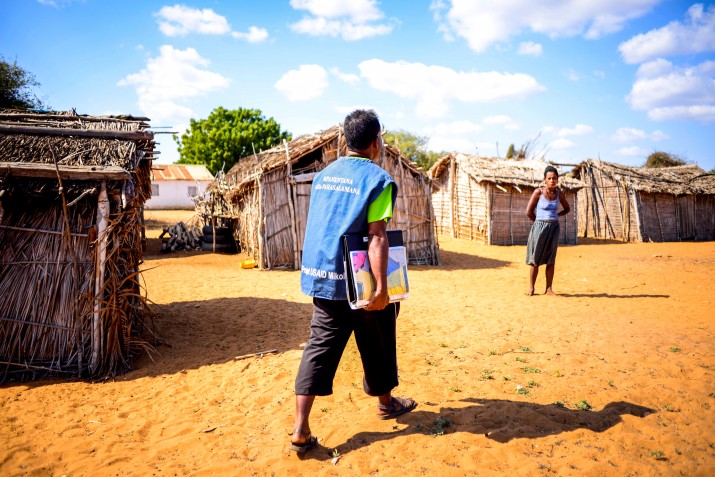Community Health Volunteers Combat Malaria in Madagascar
Community Health Volunteers Combat Malaria in Madagascar
Photos and story by Samy Rakotoniaina

The entire population of Madagascar is at risk for malaria, and severe malaria is among the top five causes of death in the country, especially among young children, for whom the disease is a major killer of Malagasy children under five years of age. In this age group the national mortality rate is 7 percent, though this rate varies throughout Madagascar’s 22 regions; ranging from less than 1 percent in the central highlands to almost 11 percent in the coastal regions. Malaria disproportionately affects the poorest and least-educated families and is far more common in remote, rural areas than in urban and peri-urban areas. However, malaria is entirely preventable through simple, low cost measures. It is also curable, especially when diagnosed early and promptly treated.
The United States Agency for International Development (USAID) Mikolo Project, implemented by Management Sciences for Health (MSH) and funded through the U.S. President’s Malaria Initiative (PMI), supports over 6,800 community health volunteers (CHVs), and works towards helping eliminate malaria in Madagascar through awareness raising, prevention, treatment, and epidemiologic surveillance. CHVs are on the frontlines of this effort, saving the lives of thousands of people in villages across Madagascar.
![[CHVs hold group sessions to teach people healthy behaviors to avoid getting malaria.]](https://msh.org/wp-content/uploads/2017/10/02-group-session_web.jpg)
CHVs are trained and then equipped with tools and resources to hold small group education sessions within their communities. They use these sessions to educate people about malaria and how to recognize early symptoms.
![[CHV Zafy André uses home visits to reach more members of his community in south western Madagascar.]](https://msh.org/wp-content/uploads/2017/10/03-home-visits-edited_web.jpg)
In addition to the group sessions, CHVs also go door-to-door raising malaria awareness. They contribute to improving the health of mothers and young children by referring pregnant women to health centers for at least three malaria-specific treatments during their pregnancy care visits. CHVs also encourage the people in their communities to adopt health care seeking habits, which is especially important in a country where people often look to traditional healers when they are ill.
![[Sleeping under an insecticide-treated mosquito net protects all community members from malaria.]](https://msh.org/wp-content/uploads/2017/10/04-bednets_web.jpg)
Insecticide-treated nets are one of the most effective ways to avoid getting malaria. CHVs encourage people to sleep under long-lasting, insecticide-treated nets to avoid mosquito bites, and demonstrate how to use the nets effectively. CHVs perform house visits to check that families are continuously and properly using their bed nets, and to ensure new beds in the home also have nets.
![[USAID Madagascar’s Health, Population and Nutrition Office Director, Daniele Nyirandutiye, demonstrates proper indoor residual spraying techniques in Vohipeno, Eastern Madagascar.]](https://msh.org/wp-content/uploads/2017/10/05-residual-spray_web.jpg)
Madagascar’s national malaria control strategy promotes the use of insecticide-treated bed nets and includes the practice of indoor residual spraying to interrupt malaria transmission. During spraying campaigns, CHVs inform people about how this method will provide protection against malaria, precautions and necessary home preparation before spraying, and assist with registering homes to be sprayed. CHVs also perform post-spray visits to ensure people are following guidelines to maximize the effectiveness of the treatment.
![[Zafy André completes forms reporting community health data. CHVs are an integral part of Madagascar's health system and regularly submit community health data on malaria, which informs decisions and policy at the national level.]](https://msh.org/wp-content/uploads/2017/10/06-reporting_web.jpg)
CHVs are at the ground floor of national malaria monitoring. They conduct and report epidemiological surveillance of malaria cases at the community level, in collaboration with health centers, including providing alerts of outbreaks. CHVs submit monthly reports to the health system and thus contribute to the national malaria control strategy with up-to-date information from the field.
![[Managing malaria in their communities is made easier for CHVs by rapid diagnostic tests that can identify simple malaria cases. Here, Zafi André checks the result of a rapid diagnostic test administered to a child with a fever.]](https://msh.org/wp-content/uploads/2017/10/07-diagnostic-test_web.jpg)
CHVs are equipped with health commodities and tools to diagnose and treat uncomplicated malaria cases at the community level. When a child has a fever, CHVs administers a rapid diagnostic test to confirm if it is malaria before offering treatment.
![[Treating children like this two-year-old, who tested positive for malaria, is one of many reasons why CHVs serve a vital role in Malagasy communities.]](https://msh.org/wp-content/uploads/2017/10/08-treatment-with-act_web.jpg)
Confirmed malaria cases are treated with artemisinin combination therapy, a fast-acting antimalaria medicine that helps to prevent life-threatening complications. Complicated cases of malaria are directly referred to the closest health center, which helps reduce malaria deaths.
![[A CHV from southwest Madagascar submits his reports to the head of a health center.]](https://msh.org/wp-content/uploads/2017/10/09-collaboration-with-csb_web.jpg)
Basic health centers across Madagascar routinely interact with CHVs to help them deliver reliable health services and foster behavior change. CHVs are trained and supervised by the Ministry of Public Health’s National Malaria Control Program, with support from USAID and PMI partners, including the USAID Mikolo Project, to provide a continuum of care that includes prevention and case management of malaria at the community level, and referral of complicated malaria cases to the closest health center.
![[With the support of the President's Malaria Initiative, USAID, and USAID Mikolo, CHVs are able to keep children like this four-year-old girl safer from malaria, giving them a better chance at a long, healthy life.]](https://msh.org/wp-content/uploads/2017/10/10-girl_web.jpg)
The contributions of CHVs in strengthening Madagascar’s health system, especially in the area of malaria prevention, has been widely acknowledged by the Malagasy Government and by their development partners and donors. These volunteers work tirelessly every day to save mothers and children from this deadly infectious disease and to keep their communities healthy.